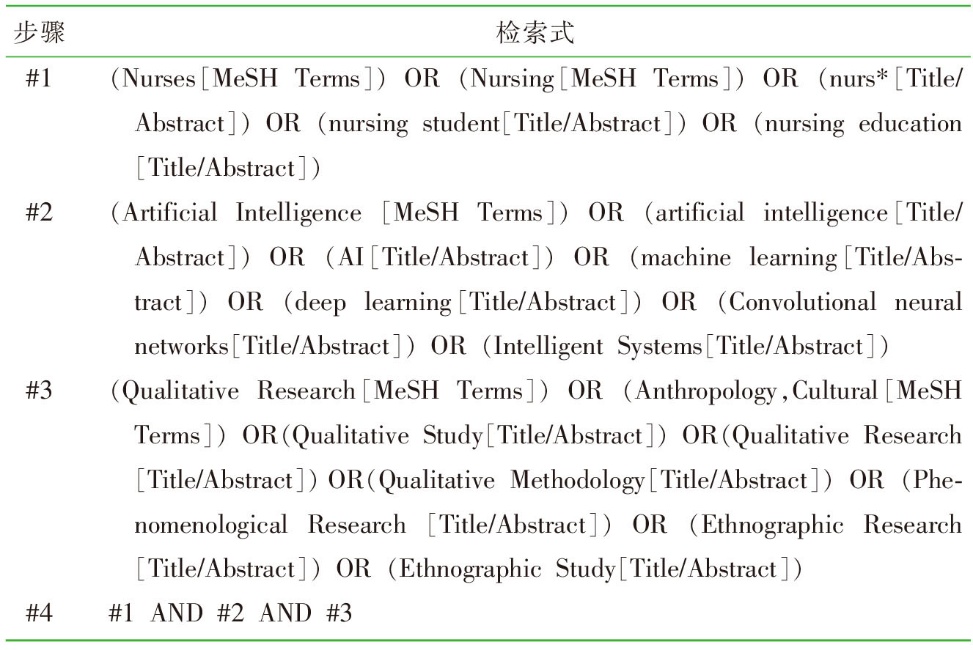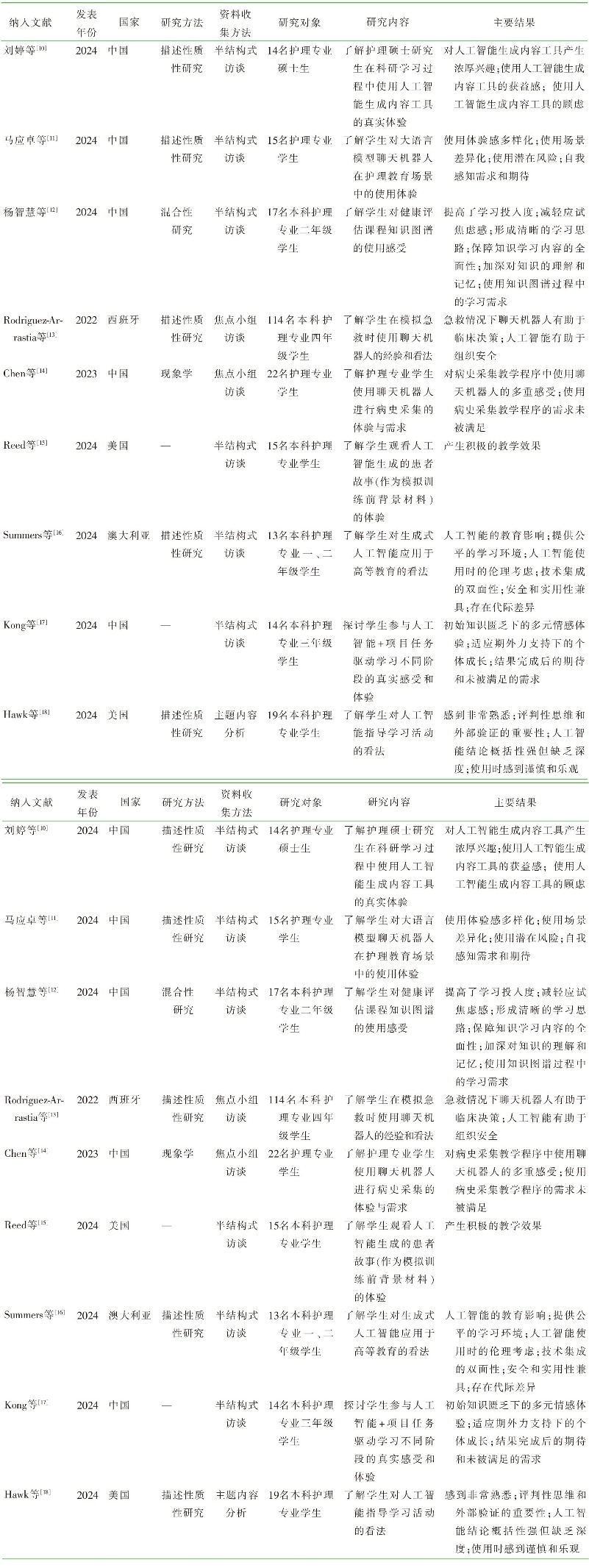| [1] |
曹婧, 杨磊, 李小妹. 人工智能赋能护理教育的实践路径与展望[J]. 中华护理教育, 2025, 22(4):389-392.
|
|
Cao J, Yang L, Li XM. Practical pathways and future prospects of AI-powered nursing education[J]. Chin J Nurs Educ, 2025, 22(4):389-392.
|
| [2] |
Lifshits I, Rosenberg D. Artificial intelligence in nursing education:a scoping review[J]. Nurse Educ Pract, 2024,80:104148.
|
| [3] |
张山, 刘璐, 吴瑛. 基于知识图谱的人工智能在护理教学中的研究热点与趋势[J]. 中国实用护理杂志, 2024, 40(30):2365-2371.
|
| [4] |
王雅琦, 高洁, 王克芳. 生成式人工智能在护理模拟教学中的潜在应用价值、挑战和展望[J]. 中华护理教育, 2024, 21(9):1076-1081.
|
|
Wang YQ, Gao J, Wang KF. Potential application value,challenges,and prospects of generative artificial intelligence in nursing simulation education[J]. Chin J Nurs Educ, 2024, 21(9):1076-1081.
|
| [5] |
马应卓, 王俊, 刘彤, 等. 大语言模型在护理学领域应用的范围综述[J]. 护理学杂志, 2024, 39(19):124-129.
|
|
Ma YZ, Wang J, Liu T, et al. A scoping review of the applications of large language models in nursing science[J]. J Nurs Sci, 2024, 39(19):124-129.
|
| [6] |
陈红, 喻婷, 许珂, 等. 人工智能在护理专业学生智慧教育中的应用与建议[J]. 中华护理教育, 2025, 22(4):409-415.
|
|
Chen H, Yu T, Xu K, et al. Applications and recommendations of artificial intelligence in the smart education of nursing students[J]. Chin J Nurs Educ, 2025, 22(4):409-415.
|
| [7] |
孙皓, 时景璞. 循证医学中PICO模型的扩展及其在定性研究中的应用[J]. 中国循证医学杂志, 2014, 14(5):505-508.
|
|
Sun H, Shi JP. Expansion of PICO model in evidence-based medicine and its application in qualitative research[J]. Chin J Evid Based Med, 2014, 14(5):505-508.
|
| [8] |
Institute TJB. Criticl appraisal checklist for qualitative research[EB/OL]. [2020-11-05]. http://joannabriggs.org/research/critical appraisa-l-tools.html.
|
| [9] |
Lockwood C, Munn Z, Porritt K. Qualitative research synthesis:methodological guidance for systematic reviewers utilizing meta-aggregation[J]. Int J Evid Based Healthc, 2015, 13(3):179-187.
|
| [10] |
刘婷, 杨富国, 杨丽, 等. 护理硕士研究生使用人工智能生成内容工具体验的质性研究[J]. 中华护理教育, 2024, 21(9):1046-1051.
|
|
Liu T, Yang FG, Yang L, et al. A descriptive qualitative study on the experience of using artificial intelligence generated content tools among nursing postgraduate students[J]. Chin J Nurs Educ, 2024, 21(9):1046-1051.
|
| [11] |
马应卓, 王俊, 李雪连, 等. 护生对大语言模型聊天机器人使用体验的质性研究[J]. 护理学杂志, 2024, 39(16):69-72.
|
|
Ma YZ, Wang J, Li XL, et al. Qualitative study on nursing students’ experience in the use of large language model chatbots[J]. J Nurs Sci, 2024, 39(16):69-72.
|
| [12] |
杨智慧, 李兴雯, 闭晓君, 等. 健康评估课程知识图谱的构建及初步应用研究[J]. 中华护理教育, 2024, 21(9):1035-1040.
|
|
Yang ZH, Li XW, Bi XJ, et al. Construction and application of knowledge graph in health assessment course[J]. Chin J Nurs Educ, 2024, 21(9):1035-1040.
|
| [13] |
Rodriguez-Arrastia M, Martinez-Ortigosa A, Ruiz-Gonzalez C, et al. Experiences and perceptions of final-year nursing students of using a chatbot in a simulated emergency situation:a qualitative study[J]. J Nurs Manag, 2022, 30(8):3874-3884.
|
| [14] |
Chen YY, Lin QR, Chen XH, et al. Need assessment for history-taking instruction program using chatbot for nursing students:a qualitative study using focus group interviews[J]. Digit Health, 2023,9:20552076231185435.
|
| [15] |
Reed JM, Dodson TM. Generative AI backstories for simulation preparation[J]. Nurse Educ, 2024, 49(4):184-188.
|
| [16] |
Summers A, El Haddad M, Prichard R, et al. Navigating challenges and opportunities:nursing student’s views on generative AI in higher education[J]. Nurse Educ Pract, 2024,79:104062.
|
| [17] |
Kong WJ, Ning YH, Ma T, et al. Experience of undergraduate nursing students participating in artificial intelligence + project task driven learning at different stages:a qualitative study[J]. BMC Nurs, 2024, 23(1):314.
|
| [18] |
Hawk H, Coriasco M, Jones JR. Generative artificial intelligence:a reflexive thematic analysis of nursing students’ perceptions following a guided learning activity[J/OL]. Nurse Educ, 2024. https://pubmed.ncbi.nlm.nih.gov/39288334/.
|
| [19] |
Ma Y, Liu T, Qi J, et al. Facilitators and barriers of large language model adoption among nursing students:a qualitative descriptive study[J]. J Adv Nurs, 2025, 81(8):4856-4870.
|
| [20] |
Navarro Martínez O, Fernández-García D, Cuartero Monteagudo N, et al. Possible health benefits and risks of DeepFake videos:a qualitative study in nursing students[J]. Nurs Rep, 2024, 14(4):2746-2757.
|
| [21] |
苏秦, 王艳波. 人工智能在临床护理领域应用中的伦理困境及对策[J]. 医学与哲学, 2023, 44(24):51-55.
|
|
Su Q, Wang YB. Ethical dilemmas and strategies in the application of artificial intelligence in clinical nursing[J]. Med Philos, 2023, 44(24):51-55.
|
| [22] |
罗江华, 王琳, 刘璐. 人工智能赋能课堂反馈的伦理困境及风险化解[J]. 现代远程教育研究, 2022, 34(2):29-36.
|
|
Luo JH, Wang L, Liu L. AI enabled classroom teaching evaluation:ethical review and risk resolution[J]. Mod Distance Educ Res, 2022, 34(2):29-36.
|
| [23] |
Simms RC. Generative artificial intelligence(AI) literacy in nursing education:a crucial call to action[J]. Nurse Educ Today, 2025,146:106544.
|







